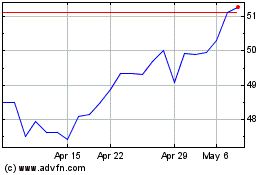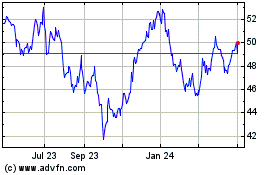Orsted Loses a Quarter of its Market Value After Warning on US Offshore Wind
30 August 2023 - 11:32PM
Dow Jones News
By Dominic Chopping
Danish renewable energy company Orsted lost a quarter of its
market value Wednesday after warning of hefty impairments related
to three wind projects off the east coast of the U.S., adding
further pressure to an industry hit by surging costs and supply
delays.
Offshore wind developers are facing strong headwinds at the same
time as demand for renewable energy is greater than ever, with
governments moving to hit climate targets and boost electricity
supplies. The Biden administration is targeting 30 gigawatts of
offshore wind power to be installed by 2030, enough to power
roughly 10 million homes, up from essentially zero now, and the
country has opened up areas mainly along the east coast for
development whilst offering tax credits to encourage development
and cut costs.
But soaring inflation has seen materials and services costs rise
while higher interest rates mean financing costs have surged,
sending project costs spiraling out of control and forcing
developers to renegotiate or exit contracts as projects are no
longer profitable.
Norway's Equinor and Britain's BP are developing three wind
farms off the coast of New York and said in June that they will
need to renegotiate power prices or the projects won't get
financing, while a subsidiary of Spanish multinational Iberdrola
last month agreed to pay $48 million to back out of an offshore
wind-power deal in Massachusetts that it bid in September 2021,
when project economics were more favorable.
A first-ever auction of offshore wind development rights in the
Gulf of Mexico resulted in a single $5.6 million winning bid on
Tuesday, while two areas offshore Texas that were offered received
no bids at all.
Orsted's chief problems relate to three U.S offshore projects;
the company said late Tuesday it could book up to 16 billion Danish
kroner ($2.34 billion) in impairments in its third quarter earnings
next month after reviewing the projects.
Those projects haven't yet reached a final investment decision,
which is the final stage before a project gets fully sanctioned,
and Orsted said that although it hopes to move ahead, it will
continue to explore alternative options.
"As we mature towards final investment decision, if the
walk-away scenario is the economical, rational decision for us,
then this remains a real scenario for us as an alternative to
actually taking the final investment decision," Chief Executive
Mads Nipper said on a media call after the announcement.
Orsted has eight U.S. offshore projects off the coast of
Connecticut, Maryland, New Jersey, New York and Rhode Island.
The company is facing delays from suppliers, mainly from
companies that build the offshore foundations as well as from a
specialist installation vessel, which could create knock-on effects
for final installation as well as potentially delaying revenue and
increasing costs, but assuming no further supply chain issues the
company will book impairments of up to DKK5 billion from this
issue.
As part of U.S. efforts to encourage offshore development it
offers tax incentives to wind developers which comprise a series of
tax credits based on certain criteria such as using domestically
produced materials and various jobs and location criteria, among
others.
Orsted said it is in discussions with federal stakeholders to
qualify for additional tax credits beyond 30%, aiming to qualify
for at least 40% of credits on all of its projects, however, due to
the lack of capacity in U.S. industry it's currently impossible for
any developers to qualify for the extra 10%. The company is
"pushing really hard" to change the situation, Nipper said.
If its efforts prove unsuccessful, it could lead to impairments
of up to DKK6 billion. In addition, if U.S. long-dated interest
rates remain at the current level by the end of the third quarter,
the company said it will cause impairments of around DKK5
billion.
"We still believe in the long term potential of the U.S. market
but something needs to happen short-term in order for this industry
to be scalable...it's extremely important that the federal
government takes this as seriously as they possibly can if they
still intend to have scalable offshore wind," Nipper said.
Orsted regularly evaluates all of its projects and Nipper said
that at the moment its projects in the rest of the world are not in
impairment territory.
However, other companies are facing similar problems in Europe.
Swedish state-owned utility group Vattenfall last month decided to
stop development of an offshore wind farm off the U.K. coast as
higher inflation and interest rates meant the guaranteed price for
electricity produced at the project was no longer enough to ensure
project profitability.
Helene Bistrom, head of Vattenfall's wind business, said at the
time that a decent mechanism that reflected the current market
situation was needed and that talks within the industry with
suppliers, the U.K. government and developers were continuing.
Suppliers, too, have felt the pinch. Turbine maker Vestas Wind
Systems has seen its shares fall 20% this year amid slowing orders
as higher project costs and slow European permitting weigh on
orders. Hopes have been high that the U.S. push into offshore wind
would provide a boost to orders in the second half of this year,
but shares slipped as much as 5.2% following news of Orsted's U.S.
woes.
At 1258 GMT, Orsted shares were trading 25% lower at DKK422.
Write to Dominic Chopping at dominic.chopping@wsj.com
(END) Dow Jones Newswires
August 30, 2023 09:17 ET (13:17 GMT)
Copyright (c) 2023 Dow Jones & Company, Inc.
Iberdrola (PK) (USOTC:IBDRY)
Historical Stock Chart
From Apr 2024 to May 2024

Iberdrola (PK) (USOTC:IBDRY)
Historical Stock Chart
From May 2023 to May 2024
